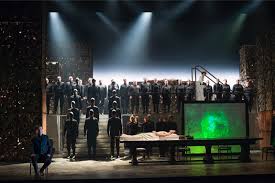Saturday 10 May 2014
Few new operas make a strong and positive impact on their first encounter, but ENO seem to have struck lucky with Julian Anderson’s Thebans. The musical world he creates is compelling throughout, moving us swiftly and with great clarity through the complex narrative. As with the original text by Sophocles the chorus plays a vital part and choral writing is one of Julian Anderson’s great strengths. In the first act I put my trust in fate is the first of a number of highly effective set pieces, muscular in texture but emotionally clear and precise.
Frank McGuiness has repositioned the three Theban plays to allow for Antigone to die in the middle act and for us then to go back to the death of Oedipus to reflect on why Creon because so brutal and why Antigone makes the sacrifice she does. That this re-structuring works so well is as much a tribute to the quality and clarity of the text as to the music. There are many times when the vocal line in unaccompanied or supported by very few instruments, and even with more bravura writing there is little difficulty following the shifts in characterisation.
Pierre Audi’s production puts all the protagonists on stage in the first act, even those who do not sing, so that we are aware of a close, claustrophobic city, where the crowd mix and mingle uncomfortably with royalty. All this is set within Tom Pye’s cages of rough stone, the sort used for sea defences or hold back dams. It is a highly effective metaphor for the chaos to come, and the broken cage in the final act a telling image for the final destructive moments.
The vocal lines are frequently lyrical with melodic snatches in keeping with the emotional states of the characters. This is often used to dramatic effect as Peter Hoare’s creepy Creon has the most mellifluous lines to sing, while Roland Wood’s Oedipus is rarely given any moments of relaxation. Susan Bickley does not have a lot to sing as Jocasta but her presence is deeply felt as is Julia Sporsen as Antigone, whose presence grows more important as the work progresses and whose music becomes ever more engaging.
Matthew Best’s Tiresias seems to hold the tragedy together, his prophetic impact constantly challenging the wilful actions of the doomed royal family, and adding the only real bass line to the ensemble.
Edward Gardner provides firm direction from the pit, allowing the many textural nuances of the score to evolve with seeming ease and in perfect balance with the singers.
This is a work which will hopefully be revived as it will surely become even more impressive on greater exposure.

